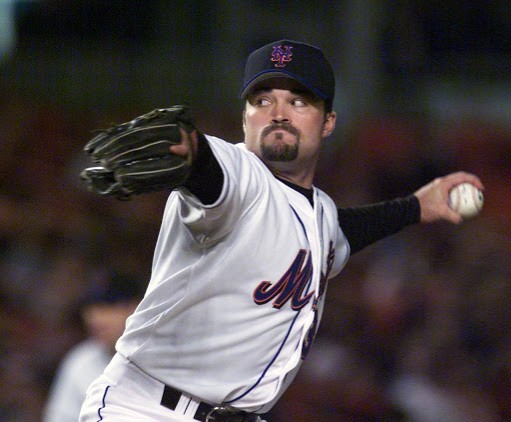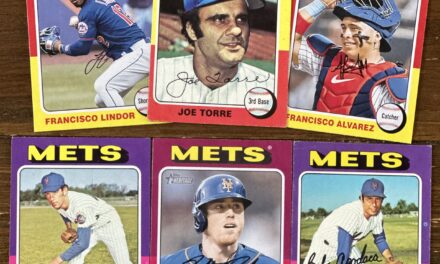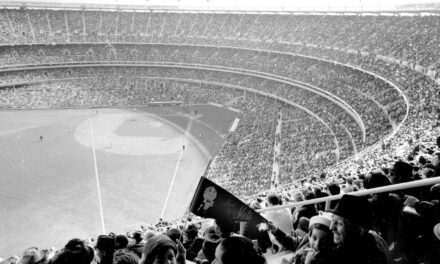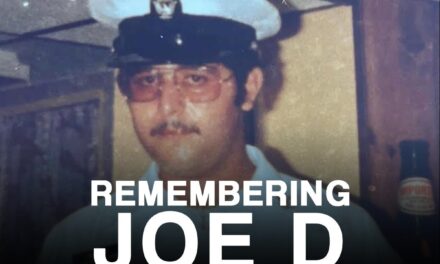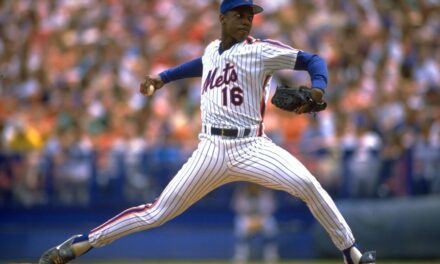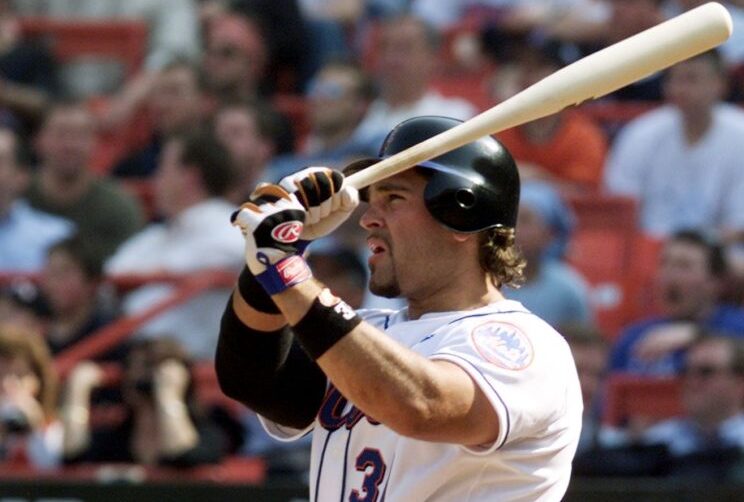
It isn’t much of a surprise Mike Piazza regularly dealt with the occupational hazards that come with the territory of being a major league catcher.
As the 1999 postseason ratcheted up, Piazza’s strong but weary body broke down.
He was only able to produce one extra-base hit, albeit a dramatic homer in Game 6 of the NLCS.
As the Mets embarked on a second consecutive postseason berth, he again fought off nagging ailments.
But the game’s best hitting backstop seemed no worse for wear.
He came into the week having avoided serious injury from his tumble into the stands at Dodger Stadium.
This, not long after a knee strain caused a brief absence from the lineup.
And on August 26 at Shea, Piazza was felled by the Arizona Diamondbacks’ Jay Bell after a collision at home plate.
He laid on the ground for a few breathless seconds, got up, and innings later connected for his 33rd home run of the year.
Though rarely did his production lead to any Mets runs, Mike hit .444 from August 21-27 and reached base at a 55 percent clip.
His batting average for the season rose to .347 and his OPS improved to 1.072.
Piazza’s two hits had little effect in the opener at San Diego. Benny Agbayani appeared to have provided the biggest blow — a three-run homer in the sixth which brought New York within a run.
The Mets tied it in the seventh, but lost in the tenth as Dennis Cook‘s control — or lack thereof — became costly.
He walked the leadoff hitter, then allowed a two-out single and another free pass before finally walking ex-Met Dave Magadan to force in the game-winner.
The ailing Piazza wasn’t the only key player discomforted.
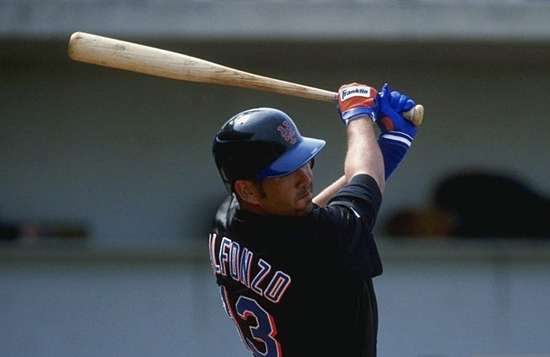
Edgardo Alfonzo suffered a groin strain and a stiff neck and he missed the remainder of the series in San Diego. Mike Hampton, meanwhile, couldn’t shake the stress fracture in his right ribs.
His absence was glaringly apparent on August 22, the day he was slated to start against the Padres if not for his injury.
In his place was Pat Mahomes — and it did not go well.
He allowed a grand slam to left field by Damian Jackson in the second. He gave up back-to-back homers into the second deck at spacious Qualcomm Stadium in the third.
The final damage: seven hits, five walks, 10 runs — in just four innings.
How bad did it get for the Mets? Derek Bell — outfielder Derek Bell — came on to pitch/mop up in what became a 16-1 blowout.
Bell didn’t fare any better than his predecessors, but that was certainly to be expected.
The Padres scored five runs against his assortment of BP fastballs. When he recorded the final out, he tipped his cap to the Qualcomm fans.
If anything, Bell spelled a depleted bullpen.
Turk Wendell, John Franco, and Armando Benitez had already been used, while Rick White and Dennis Cook worked two innings each the night before.
What the Mets needed most was to give their weary relief staff a rest.
Al Leiter did just that.
The durable left-hander worked eight full innings and matched a season-high with 12 strikeouts.
Another Damian Jackson home run in the first inning didn’t deter him, as he went on to retire the next 14 Padres in succession.
A 1-1 tie persisted until the top of the sixth, when San Diego starter Matt Clement plunked Mike Bordick with the bases loaded.
Catcher Wiki Gonzalez made another error on a potential double play of Leiter which let another run cross the plate.
Lenny Harris added more insurance with an RBI single.
The only member of the relief staff who was needed was Benitez, who nailed down the 4-1 victory with save No. 34.
Leiter, meanwhile, improved to 14-5 with a 3.08 ERA.
With the combination of Leiter’s lengthy outing plus a travel day back east, manager Bobby Valentine could feel comforted knowing he had fresh arms at his disposal.
However, it was the Diamondbacks’ main arm that presented the greatest concern for New York.
Arizona came to Shea aiming to close the game on the Mets, who held a 5.5-game lead in the Wild Card standings.
And it couldn’t ask for a better person to send to the mound.
Randy Johnson was on the verge of his second straight NL Cy Young Award.
He came into the contest sporting a 16-4 record, a 2.30 ERA, and 278 strikeouts.
But if any team felt a sense of confidence against the “Big Unit,” it was these Mets. After all, they tagged Johnson for seven runs in Game 1 of last year’s Division Series and made him look human on May 21, scoring five times (despite 13 Ks), thanks primarily to mighty mite Joe McEwing.
And on August 4, he took another loss while his defense did him no favors.
Mortal Johnson showed up once more on August 25.
The Mets tallied three runs in the second with the help of a Matt Williams error.
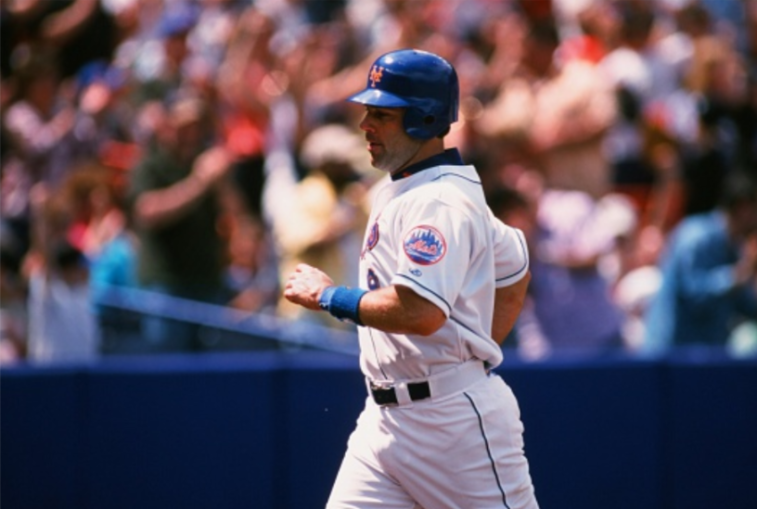
Todd Zeile and Jay Payton then delivered third-inning RBI hits that pushed New York’s lead to 6-0 and sent Randy to the clubhouse.
At 2.1 innings, it was his shortest outing of the year.
The Mets continued to hammer Arizona pitching, eventually thumping the D-Backs, 13-1.
After the offense came down to earth on Saturday (save for Piazza’s post-collision homer), the Mets bats remained relatively silent in the rubber game.
Luckily, Mike Hampton was healthy again.
He showed no ill-effects of the rib injury which put him out for 10 days.
In eight innings, he gave up just three hits and one run.
And thanks to Zeile’s tiebreaking hit in the seventh, he left with the lead.
Diamondback arms were nearly as effective, while the defense kept the Mets in check as well.
Steve Finley made a wonderful catch in center field nearly a year too late.
The Mets gladly accepted that trade-off of being robbed in August 2000 versus October 1999 when Todd Pratt homered to send the Mets past Arizona and into the NLCS.
If Arizona wanted to entertain ideas of returning to the postseason, it would have to overtake the Mets again.
But by claiming two of three versus the D-Backs, New York built it’s Wild Card lead back up to five-and-a-half with nearly a month remaining in the regular season.


